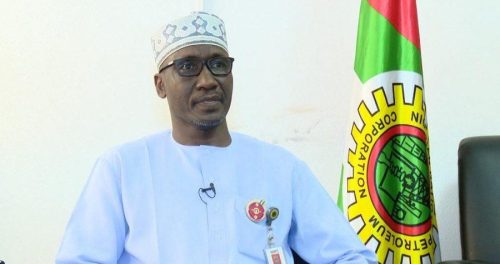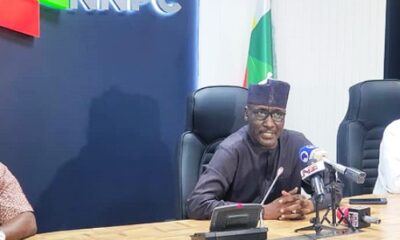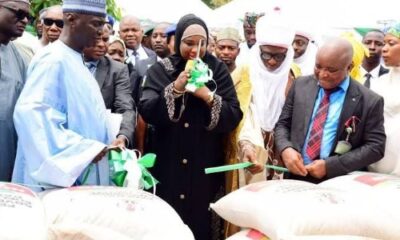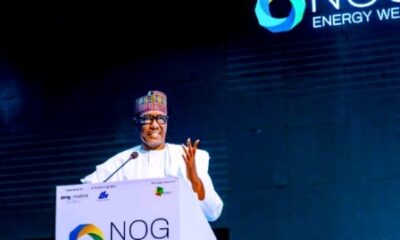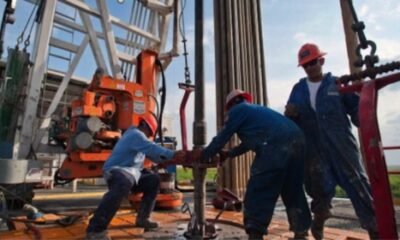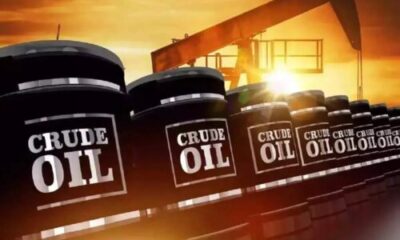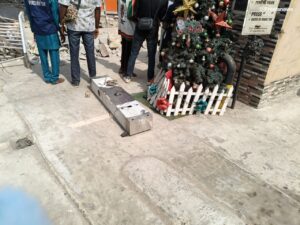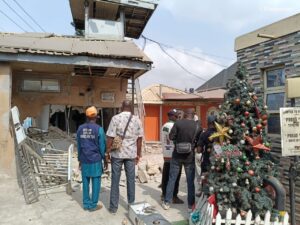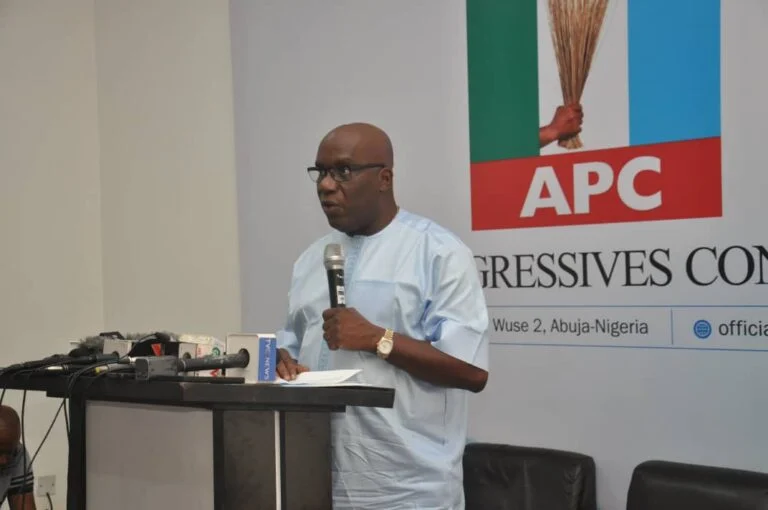According to the Nigerian National Company Limited (NNPC) yesterday, investigation has shown that Methanol was discovered in four fuel cargoes imported by MRS, Emadeb/Hyde/AY Maikifi/Brittania-U Consortium, Oando, and Duke Oil.
Mallam Mele Kyari, NNPC’s Group Managing Director, said this during a press conference yesterday but added that he has subsequently ordered the holding back of any concerned products in transit (both truck & marine).
The NNPC has also reportedly instructed oil trading firms to embark on an emergency supply of fuel to replace cargoes that have been rejected due to low quality, according to two sources quoted by Reuters yesterday.
Apparently disturbed by the development, the federal government yesterday ordered an investigation into the bad fuel that had damaged the engines of some vehicles.
In addition to disrupting the country’s fuel supply chain, the product which led to the damage of several cars, the NNPC disclosed, was imported from Antwerp in Belgium.
Speaking in Abuja, Kyari, argued that petrol brought into Nigeria usually does not include the test for the level of methanol content.
The NNPC helmsman maintained that cargoes’ quality certificates issued at the loading port in Belgium, by AmSpec Belgium, indicated that the product complied with Nigerian specifications.
Furthermore, he said the NNPC quality inspectors including GMO, SGS, GeoChem, and G&G conducted tests before discharge, which showed that the cargo also met the country’s standard.
“As a standard practice for all PMS import to Nigeria, the cargoes were equally certified by inspection agent appointed by the Midstream and Downstream Petroleum Regulatory Authority (NMDPRA) has met Nigerian specification.
“It is important to note that the usual quality inspection protocol employed in both the load port in Belgium and our discharge ports in Nigeria do not include the test for percent of methanol content and therefore the additive was not detected by our quality inspectors,” he said.
Kyari disclosed that the NNPC had ordered the quarantine of all un-evacuated volumes of the contaminated fuel that led to the disruption of the petrol distribution value chain, in order to prevent further distribution.
He stressed that the NNPC and other stakeholders were making serious efforts to resolve issues generated by the supply and discharge of methanol blended products in some Nigerian depots.
Kyari noted that the NNPC first received a report on January 20, 2022, from its quality inspector of the presence of “emulsion particles” in petrol cargoes shipped to Nigeria from a European country.
He added: “In order to prevent the distribution of the petrol, we have ordered the quarantine of all un-evacuated volumes and the holding back of all the affected products in transit (both truck & marine).
ALSO READ: Adulterated Petrol: FG May Return Fuel To Suppliers, 100m Liters Affected – Marketers
“All defaulting suppliers have been put on notice for remedial actions and NNPC will work with the authority to take further necessary actions in line with subsisting regulations.
“NNPC wishes to reassure Nigerians that we are currently sourcing additional cargoes to ensure product sufficiency.”
According to him, the NNPC has ordered that all the affected products in transit (both truck & marine), should be withheld.
But the NNPC GMD’s explanation ran contrary to an earlier press statement released by MRS, where the company denied culpability.
In its statement MRS had stated that it remains a responsible corporate citizen and will not be involved in the purchase, importation, distribution or marketing of substandard petroleum products in the country, coming short of directly accusing the NNPC of complicity.
“Due to the current subsidy regime, NNPC is the sole supplier of all PMS in Nigeria. Consequently, the NNPC through their trading arm Duke Oil, supplied a cargo of PMS purchased from international trader Litasco and delivered it with Motor Tanker (MT) Nord Gainer. This vessel discharged in Apapa between the 24th and 30th of January, 2022,” it had alleged.
ALSO READ: 300 Million Litres Of Petrol Arrive To Close Supply Gap – FG
As one of the beneficiaries, MRS said it received the product in its depot and distributed the product to only eight of its stations in Lagos.
The company described the allegation trending at the time as mischievous, false, and untrue.
But the NNPC boss maintained that the methanol blended petrol was imported into the country by the suppliers, including MRS, through its Direct-Sales-Direct-Purchase arrangement.
The arrangement allows the national oil company to deliver monthly crude oil lifting on a Free on Board (FOB) basis to suppliers who in return are supposed to deliver petroleum products of Nigerian standard specification to NNPC.
The petroleum products delivered are usually equivalent in value to the crude oil received from NNPC subject to the general terms and conditions as advised.
But according to the NNPC, the companies that supplied the methanol blended petrol included MRS which made the importation through a vessel named MT Bow Pioneer.
He said while Emadeb/Hyde/AY Maikifi/Brittania-U Consortium brought in the fuel through a vessel identified as MT Tom Hilde, Oando allegedly brought in the product through a vessel named MT Elka Apollon, while Duke Oil came through MT Nord Gainer vessel.
Fuel queues had been building in Lagos and the Federal Capital Territory (FCT), Abuja, due to fuel shortages caused by the withdrawal of the contaminated petrol from the market. But NNPC was said to be seeking thousands of tonnes of the product to ameliorate the situation, the report said.
The Nigerian Midstream and Downstream Petroleum Regulatory Authority (NMDPRA) had said it found fuel with methanol above national specifications in the supply chain and removed the fuel from circulation. Although methanol, in small amounts, is a regular gasoline additive, the regulator said the supplier of the off-specification gasoline was known but did not name the firm.
Nigeria depends almost entirely on imports to meet its domestic fuel needs after many failed attempts to revamp the dilapidated refineries, with daily consumption exceeding 60 million liters.
NNPC handles nearly all the imports through crude-for-fuel contracts, known as Direct Sale, Direct Purchase (DSDP), with consortia of local and foreign oil firms.
Each consortium receives 20,000 barrels per day (BPD) of crude oil in exchange for products, making the combined total about 320,000 BPD of Nigeria’s output.
Nigerians feel that cheap fuel is one of the few benefits the average Nigerian gets from the government, which sets price caps at the pump through a controversial and patchy subsidy scheme.
Meanwhile, Chief Executive Officer of NMDPRA, Farouk Ahmed, yesterday stated that NNPC had received delivery of 300 million liters of petrol to close the supply gap created in the country by the withdrawal of the off-spec petrol.
Speaking in Lagos, when he met with marketers in a bid to raise distribution and remove the substandard fuel from the supply chain, Ahmed said the 300 million liters arrived through six vessels ordered by NNPC. He noted that with the latest delivery, the fuel queues being witnessed in the country should disappear by Friday.
Ahmed said, “Today, I am happy to say that loading has been going on in most of the depots because we have been able to identify, isolate and quarantine the limited amount of gasoline that was affected by the methanol volume that was discovered.
“We have vessels that have arrived in the country recently. At least six arrived in the last few days, ordered by the NNPC, carrying a total volume of close to 300 million liters, just to close the gap created by those vessels we have withdrawn from the system.”
In addition, Ahmed disclosed that there was a 9,000-metric tonne vessel that was being discharged at the Apapa Port to major marketers, including OVH, TotalEnergies, 11 Plc, Conoil, and Ardova Plc.
According to him, as soon as the vessels complete discharging and start pushing products to oil marketers, the fuel queues in Lagos should fully disappear by Friday.
“So, once these vessels complete discharging and start pushing the products to marketers, I believe Lagos will be cleared by Friday,” Ahmed stated.
He added, “We have got that assurance from the marketers. Also, most of these vessels will be providing volumes to most of the key members of DAPPMAN.”
But the NMDPRA boss stated that the country currently had petrol that could last for 20 days, 10 days short of the usual 30-day reserve.
He said, “Our ideal days of sufficiency is 30 but this happened because of the concern that made us withdraw the vessels, which created the gap in our 30 days sufficiency.
“Again, with aggressive importation by the NNPC, this will be closed in a few days, according to the data we got from the NNPC’s import program.
“Loading is also ongoing in most of the depots that have confirmed spec products; so, there is no need for panic. Hopefully, by tomorrow, Lagos will be cleared.”
The regulatory agency said it was also working to address the challenge thrown up by the importation of substandard petrol into the country.
Other attendees at the meeting included top officials of NNPC, Major Oil Marketers Association of Nigeria (MOMAN), and members of the Depots and Petroleum Products Marketers Association of Nigeria (DAPPMAN).
FG Orders Investigation
Briefing newsmen at Abuja, after the weekly virtual Federal Executive Council (FEC) meeting, presided over by President Muhammadu Buhari, Minister of State for Petroleum Resources, Timipre Sylva, said the government had initiated moves to investigate the supply and circulation of adulterated petrol in the country. Sylva said the federal government wanted to get to the root of the matter, and warned against hasty conclusions.
“I didn’t expect you to draw any conclusions yet,” the former Bayelsa State governor said. “There will be a major investigation to unravel everything and then let us really get to the bottom of it before we can come back and tell you what is going to happen to the culprits,” he added.
The minister assured that the government would consider compensating those who might have been adversely affected by the bad fuel.
“We know that some people’s vehicles must have also been damaged, that is also going to be taken into consideration in dealing with the situation,” he stated.
Asked whether the issue was discussed at the FEC meeting and whether the suppliers would be punished, Sylva said, “The issue did not come up in council, but, of course, you will recall I was here yesterday to brief Mr. President on the issue. I’m not in a position to disclose the identities of the companies, but there are some issues and we are actively tackling it.
“Nobody has, before now, checked for methanol in our fuel, it’s not very usual and this is the first time this is happening and the NNPC is up to the task.
“I will also convey your question to the NNPC and maybe the Midstream and Downstream Regulatory Authority, but we are actively handling it and I want to assure you that the problem will be a thing of the past very soon.”
MRS had in a newspaper advertorial yesterday said Duke Oil supplied a cargo of the adulterated petrol, which it purchased from an international trader, Litasco, and delivered with Motor Tanker (MT) Nord Gainer. MRS further stated the vessel was discharged in Apapa, Lagos, between January 24 and 30, 2022, explaining that major marketers received the following quantities: OVH – 10,000mt; MRS – 5,000mt; NIPCO – 5,958mt; ARDOVA – 6,000mt; and TOTAL – 10,000mt
Sylva also spoke on the approval granted to his ministry by the council, saying FEC okayed the contract for the construction of the 17-storey local content building in Yenagoa at the cost of N1.817 billion.
He explained, “You will recall that in 2020, Mr. President already commissioned that project. There were some ancillary works that had to be done to connect some of the buildings and that was now presented to the council for the sum of N1.817 billion this now closes out this contract and we have told the contractor. This is the full and final payment for everything.
“So, this is the end of this project and we have completely delivered this to Nigerians.”
Meanwhile, the Independent Petroleum Marketers Association of Nigeria (IPMAN) engaged the services of the Association of Distributors and Transporters of Petroleum Products (ADITOP) to ensure uninterrupted distribution of petroleum products and maintain sanity in the downstream sector of the oil and gas industry.
IPMAN President, Mr. Chinedu Okoronkwo, who disclosed this to journalists yesterday said the strategy would weaken the threat by the National Association of Transport Owners (NARTO), which recently issued a threat to embark on industrial action.
Okoronkwo said IPMAN was not part of any trade association and would not embark on industrial action to further compound the predicament faced by Nigerians. He said members were already heavily indebted to banks and could not afford to stagnate their businesses, adding that already, many have shut down operations as a result of the harsh operating environment.
The president said IPMAN was ready to confront the excesses of the NARTO and Petroleum Tanker Drivers (PTD), who he alleged illegally fleeced marketers.
Okoronkwo stated, “They are not registered under oil and gas, but as dry dock. But today they are gradually redefining the operations of marketers who have signed bulk purchase arrangements with the NNPC.
“We have lost over N27 billion over time from illegal fees they collect from marketers. They collect about N45,000 per truck and take in millions that ought to be part of our margins and are building stations and purchasing trucks at the expense of duly licensed marketers.”
Okoronkwo raised concern about the dwindling margins of marketers and the heavy debts hanging on the necks of IPMAN members.
“The products we purchased with N1 million in the past is now about N7 million without additional margin to operators,” he said.
NARTO had threatened to stop haulage of petroleum products across the country over the hike in the price of diesel to N430 per liter and other operational challenges. The association had earlier decried the delay in the payment of about N45 billion bridging cost and demanded an increase in the transportation allowance factored into the pump price of petrol.

 BIG STORY2 days ago
BIG STORY2 days ago
 BIG STORY3 days ago
BIG STORY3 days ago
 BIG STORY3 days ago
BIG STORY3 days ago
 BIG STORY3 days ago
BIG STORY3 days ago
 BIG STORY1 day ago
BIG STORY1 day ago
 BIG STORY5 days ago
BIG STORY5 days ago
 BIG STORY2 days ago
BIG STORY2 days ago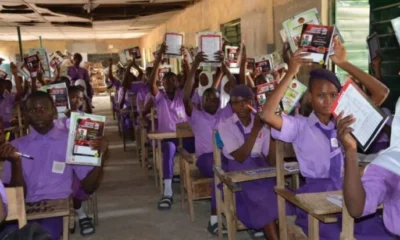
 BIG STORY3 days ago
BIG STORY3 days ago




